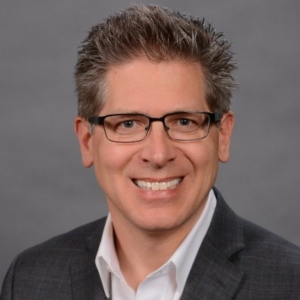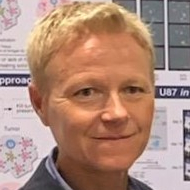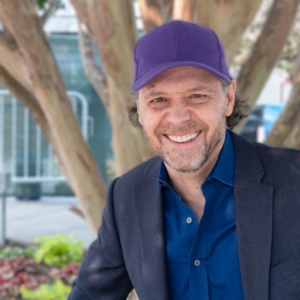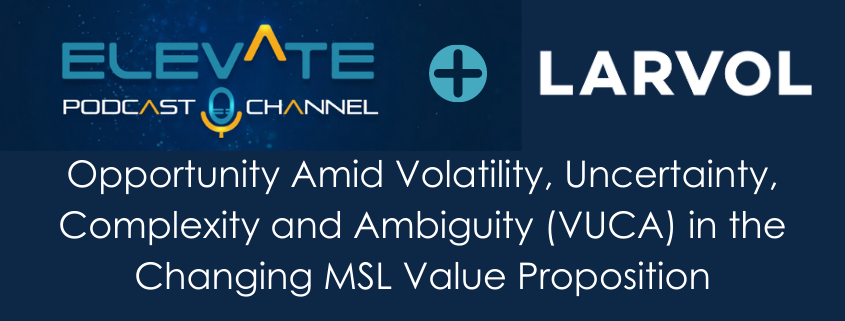Even before the COVID-19 pandemic, the structure and content of interactions between MSLs and KOLs/HCPs was shifting, with MSLs increasingly seen as trusted partners in scientific exchange and KOLs/HCPs increasingly open to technology-based communications. Of course, the pandemic has accelerated this change, shifting the mechanics of communication and collaboration and throwing into focus the definition of “value.” This podcast presents the expertise of leaders from pharmaceutical organizations Pfizer and Nektar, as well as Larvol, focusing on how MSLs bring value to HCPs and KOLs during the time of pandemic.

SPEAKER: Tim Hylan

SPEAKER: Sue Currie

SPEAKER: Bruno Larvol
Following is an automated transcription provided by otter.ai. Please excuse inaccuracies.
Garth Sundem
Welcome to this episode of the Medical Affairs Professional Society’s Podcast Series Elevate, gathering the voices of Medical Affairs thought leaders and stakeholders to explore current trends, define best practices and empower the Medical Affairs function. Opinions are those of the presenters and do not imply endorsement by their endorsement by the organizations. I’m your host Garth Sundem, Communications Director at MAPS, and today we’ll be speaking with Tim Hyland, Sue Currie, and Bruno Larvol about how MSLs deliver value to KOLs and HCPs. Tim is VP Internal Medicine Field Medical Director Group at Pfizer. Sue is VP and Head of Medical Affairs at Nektar Therapeutics. Bruno is CEO and founder of Larvol. This podcast is made possible by Larvol. Larvol has been accelerating decision making since 2004 by providing real-time customized competitive intelligence software with data-driven analytics to the pharmaceutical, biotech, and healthcare industries. Larvol’s comprehensive KOL monitoring solution, Omni, ensures that MSLs stay ahead of the competition with in-depth updates on their KOLs activity and also makes it easy for MSLs to prepare for and track engagements with their KOLs by providing access to publications, clinical trial involvement, social media posts, and upcoming conference participation. Tim, Sue Bruno, welcome! Today we are talking about VUCA, which stands for volatility, uncertainty, complexity and ambiguity, which describes our times very well. And Bruno, let’s start with your thoughts on how the value proposition is changed for MSLs based on VUCA.
Bruno Larvol
And I love that term VUCA. Actually, Tim is the one as we were preparing who mentioned it sounds like some kind of God of of trouble in some ways. It is yes. Well, I since I go first have the easy, I guess, position to make that the value proposition has not changed. I essentially in Zed essentially msls. In no way I’m not an MSL, but my customers omit cells are sitting in the same position to create value for for for their, for the key wells by helping them understand and the the evolving standard of care understand, of course, the different drugs that are changing the landscape of the practice of medicine, and that that’s one element that has no change. Now, the root cause of the pandemic has changed other things. But I would argue that the the the objective and the value has not changed in itself.
Garth Sundem
Well, that’s interesting. Well, so so Sue, what do you think? I mean, has has vuca changed the MSL value proposition or just the way that we deliver that value?
Sue Currie
You know what, I’m going to challenge and be contrary to what Bruno was saying? I think it has. And I think the value proposition in fact, has increased for MSLs. So the format and the and the process of the value has changed. But in fact, what I’m seeing now as COVID has gone on longer, the changing dynamics of even healthcare providers and their interaction with their patients has been reduced. So what does that mean? That and also then even other stakeholders within their group. So other allied health professionals are study teams. So I think in a way, it’s actually expanded or increased the value to complement the exist or the prior, more face to face interactions, even with health, health care providers and institutions. I’d love to know, Tim, what your thoughts are. So to me, the value is increased. And, and in a way, the, the format and the modality or the vehicle has changed, as well. So Tim, what are your thoughts?
Tim Hylan
So yeah, I’m picking up that theme around that modalities. I see the speed and actually digitization of content and information are two trends that are really accelerating, the importance actually of what we do and how we communicate. I mean, you can think about, you know, in today’s world, it actually takes you longer to even set up a WebEx or a Zoom meeting than it does to send content around the world and so It really challenges us that are interacting with medical customers each and every day to figure out how we can engage with them and and what modalities as you said, and also to figure out what is that compelling need and that mutual opportunity and connection that we can still maintain. So also given the complexity of medicines, the the, the just the inordinate amount of data at times that it seems that we’re all trying to sift through the need for that engagement to provide both content and the context of that information is certainly very, very important.
Garth Sundem
Okay. So is it just that MSL, the value is increased? But it’s the same value that that MSLs have been providing all along? Or are there opportunities in this new landscape for MSLs to provide a new kind of value? If anyone has perspective on that?
Sue Currie
Yeah, I’ll jump in first. And then I’d love to hear from Bruno. And Tim, I think it has increased the value and the increase the opportunities and why I go, I’m thinking about that is think of think of the from a patient centric perspective, less interactions and touch points with their health care providers. And I think that’s going to continue. So even if it’s telehealth or touch points virtually. So they’re maybe not getting those indirect educational benefits or resources or touch points. So from my perspective, I think from the for MSL, is providing additional education, maybe further interactions or opportunities with for patient engagement or other kind of alliances or patient Alliance groups, which may potentially increase? I don’t know, Tim, what are your thoughts about? Yes,
Tim Hylan
what I’ve noticed as to to follow on with that is that the diversification or the need to diversify, who we engage with has certainly been evolving, you know, we would traditionally be interacting with a certain or small segment of physicians, but again, the what I call the democratization of content and information is increasingly moving us to really be more attuned to where these conversations are happening, where people’s eyeballs are, for example, in social media, or in other ways, you know, congresses nowadays, or are at least right now are virtual, we have to sort of rethink how we engage and who we engage with in these settings. And so it’s, it’s, it’s really pushing us to diversify the kinds of medical customers that we engage in ways that we haven’t before. Bruno, your thoughts?
Bruno Larvol
I agree. And I know, you mentioned Congress and conferences, because of course, that’s a big difference for the subset of KOLs that are the most influential that that go, they go to conferences, and now they attend them virtually. And the conversation that they have among themselves, and also with the industry is no different because it’s virtual. So that’s a new situation, a new opportunity, and a big difference. And one of the question is, how much of that would continue post pandemic? And and how do we adjust to all of that moving forward?
Tim Hylan
Well, I think we’re all used to, you know, having traditional ways that we interact with our medical customers, or healthcare practitioners, and the certainly over the last eight 910 months, that’s been, you know, disrupted. And so we’re having to rethink how we engage with them in ways that can still, we can still interact with them appropriately, but also respecting the fact that their time is very limited, our time is limited. And we have to really rethink those those types of engagements. So I know for the work that I do, it’s really pushing us to think about how can we provide the most accurate up to date information in the shortest amount of time from a very credible source? And the MSL is that credible source and so trying to understand the information needs and how people consume information, which is very different now than it’s been in recent times, it really pushes us you have to really be prepared, I think, to, to be able to speak in in, get your point across in one minute, you know, five minutes or 30 minutes depending on what the customer time ability is. Yeah.
Sue Currie
And if I could add to that, it’s not just the speed and time that you have with with the healthcare provider or as you said, like the client or our stakeholders, it’s actually the time to for us to digest it. Get it out. So in this virtual environment, you know, and if we pick a Congress, he usually at least can pull things together. And since synthesize by the last day of a five day Congress will now you actually comes out instantly. And sometimes even prior to the Congress, that it’s getting out there. So how do you become that scientific expert on that? at the very same time that it’s, it’s widely disseminated. And that’s, I think what I’ve heard also from some of the even the top thought leaders is just helped me because I haven’t been there to experience it, and I and I need you to help me become an expert in it. So that, like, what you had said, is, is kind of broader. It’s flattening the curve, basically, on who’s experts out there. And, and so it has increased, I think the number of stakeholders and folks that we also have to interact with and ensure that they have the, the appropriate data and knowledge for their work.
Garth Sundem
Okay, so let’s let’s let’s transition into so it sounds like, you know, we’re reaching, we’re reaching more people, they have less time, you know, how do msls plan for these interactions? If they have to be so efficient? You know, are there core elements of value that every MSL should keep in mind when planning for these interactions?
Tim Hylan
I think I think it’s being a start with that, I think it’s being certainly first and foremost, and this is one area, which I think is not changing is being that trusted source. Being a trusted source to a partner, being seen as a peer to other healthcare professionals in the field is so important. and maintaining that credibility that you’ve built up over various interactions over time is so important. And msls can continue to be that credible source, and identifying, again, the kind of information that our hcps need to have requesting and and providing it in the way they would like to do that. So I think the credibility piece is a core element of the of the MSL role. It’s always been there. And it’s even more important now with just, again, so much different types of information and people’s beliefs about that information as well. Gets gets worked in there. And so more than ever, you know, being seen as a trusted partner is important.
Sue Currie
Yeah, I absolutely agree with you, Tim. It’s the trusted source. A really key a pivotal source. And about something I think that has come up is that the time and the rapidity, again, of synthesizing it. So the good news, I think in this and i think i don’t think it’s going to go back to what it was. So the new reality, or the new paradigm will mean the probably less travel, but what you’ll be doing versus traveling is spending that time in collating or synthesizing the data faster, because you’re not on a plane train or automobile at the time. So I think there will be that shift in time, that five days after Congress to have data available is probably going to be too long, or you’re going to be reactive, not proactive. And then and it will, then who will replace that trusted source that? And I’ve small t trusted because it may be something digital that isn’t an a trusted source or resource for our call our colleagues and stakeholders. Okay, so what are your thoughts?
Tim Hylan
Yeah, Oh, absolutely. We have to do the time between when we understand the information, and when it gets out. It’s just shrunk so much. And so I mean, you see this, even in the in the lay press, and the media, people are sort of reading the, you know, what we used to call the teletype as it’s coming out. And, and so this information goes around the world instantaneously, and everybody’s getting equal access to it. And and how do you synthesize it to understand it and put it in the context of other information that you have, as well as sorting through the beliefs about that information from the information itself and sort of as a, both a normative and a positive conversation about the content going on at the same time, and it’s very important that we, we distinguish between those two and really stick to what the content is and the information that we’re objectively providing.
Garth Sundem
Okay, so our hcps that, you know, that they’re seeking to make data driven decisions, right. And so it’s the MSL job to provide that data, you know, in large part. Bruno, what would you say about about msls and the delivery of this data that is CPUs can use in their decision making.
Bruno Larvol
I like the point that both Tim and Sue made which is the contraction of time. And the challenges coming with set contraction, because in a lot of our customers face said, so the American Society of hematology is about to happen. In a couple of days, I took two boys, maybe. And you could see on Twitter, the conversation, I started a while ago, when the initial abstract were available, a lot of the narrative about the data is starting to form. In as soon as the data is presented, that conversation is taking place on social media. Now, it’s still relatively limited in oncology, the number of colleges who are discussing they they still relatively small, but you can see it year after year, especially, of course, over the last eight months, even between esmo an ash and an escort, you can see the trend towards more and more engagement, quicker and quicker engagement. So now as an industry to help to help the KOLs in that speed become challenging. In so it’s gonna be really interesting to see how we started that I know we will as it as an industry. But it’s certainly a bit of a in I hate that word, but a bit of a game changer. In some ways.
Tim Hylan
When I thought about a lot of these, these, these Congress situations at that point Bruna about how it is the Congress is changing so quickly. It’s like, like one day, we’re all in the big box store, target Walmart walking around doing our traditional way of shopping. And then the next day, we’re all told we have to do all of our shopping online on Amazon. And so we have to immediately think about how do we engage in that space in a way that is so different than we’re all used to doing going around in a physical space. And that’s I think the challenge and not just the Congress has been a lot of different platforms, with individuals with with organizations. And it’s just overnight literally, and figuratively, we’ve had to change a different way of communicating that with our customers.
Sue Currie
And if I can build on that to what I’ve also seen is, it’s 365 days of potential scientific data coming out. So people aren’t waiting for the ashes are in in the on call, you know, he mocks space, you’re not waiting for ash or ASCO, you’ll pick anything because you’ll potentially have as high an impact in this virtual reality of going to, you know, a smaller meeting. If it’s out there, then it may be but like what you had said, Bruno, the discussion begins in the scientific engagement and discussion around these data are there. So instead of having like five blips in the year, five big bangs we made, we really have now it’s it’s wide open, it’s 365 days, because you may not if you’ve got good data, you’re going to get it out, because it’ll have great benefits. So I’d love to hear your thoughts, Tim. But that’s what I’ve seen is that there’s like, probably 24 blips in our year now versus one or two key congresses or timeframes for scientific exchange.
Tim Hylan
Yes, those those conferences were those Sentinel points where they were rallying, people would get on a plane and go to them. And it was, I think, well structured. But now everything is 24/7 365, as you said, so it’s all instantaneous. So those, those conference times become a point in which there’s a release or distribution or, or communication of information. And then there’s time after that, that you can, you know, continue to communicate and engage and respond, etc, appropriately. And so and we’re also able to more people are able to get to more of these events virtually than ever before. So it really has been I would agree with what Bruno was saying about a game changer that really, it really is challenging all of us who kind of deal in the currency of information and content and communications, to really think about how we can ensure that the voice and the credibility that we bring to the conversation is heard and has an appropriate place in that conversation because there’s just, we’re all just going scrolling through lives with, with, with our, with our devices, more than ever, and we’re having to sort of cut through a lot of that, to have our perspective known.
Sue Currie
And Tim, you’ve made my argument that I that I we started this conversation with is that I think it increases the value of the msls because there’s all this noise all of these bumpers Moments of data. So we can help to cut through and sift through and, and identify a game, what’s credible, maybe some pros and cons of it and become that trusted source. So we’re actually, again, I think that makes our role even more critical, when so much is coming out all the time to help identify what’s the quality, and the scientific, the integrity of the data coming out as well.
Tim Hylan
And what I found is that it has to use that phrase, I guess, I don’t know whose attribute to originally around. If I had more time, I would have written a shorter letter. And what I find is when we have these, these data sets with this new information, that challenge I find and what my group is doing is, is trying to figure out, how can we distill this and get the salient points in those situations where you might have shorter time to communicate or engage and still, you know, really get to the essence. And so that type of skill, I think is even more important than ever.
Sue Currie
Yeah, I absolutely agree.
Bruno Larvol
There seems to be a shift, perhaps, from the big conferences, to a lot of small events, that the two day symposium, the the ECM mean, the grand rounds, the, the the YouTube interview, the podcast, and and to the point, so you made about maybe moving toward real time when the news break, we don’t wait for ASCO anymore. And so the challenge was that that our customers are facing is that it’s really hard, it really is easy to know, when ash or ESCO, is, it’s really hard to know when Dr. So and so we’ll be doing an ecmp or grand round, or webinar it by by the equivalent, the equivalent of Joe Rogan in in their specialty. And so having some time, it’s another two weeks before. So how do you find these smaller but still important engagement opportunity to help? Okay, wells. So that was a, a little bit of a subliminal plug for what we do got, by the way. Okay.
Garth Sundem
Well, so what I wish we had another hour to talk about, and here’s what I would like to talk about is how MSL is can dive into these digital spaces. You know, it used to be one on one MSL HCP interactions, were driving the entire function. And now it seems like there’s room for msls to be to be interacting in new ways in these digital spaces, you know, in in smaller events to shape the narrative around this data almost in real time. But we don’t have time. So here’s what I’m
Tim Hylan
I was getting ready to respond to that!
Garth Sundem
No, I gotta leave it there for today, guys. And so I’m going to thank you all for joining us today, Tim, Sue and Bruno. MAPS members, continue the conversation at our community portal, maybe we will talk some of our thought leaders into joining us there. And don’t forget to subscribe. And you know, we hope you enjoyed this and what I hope will be continuing episodes with this team of the Medical Affairs professional society podcast series, Elevate. Thank you all.






